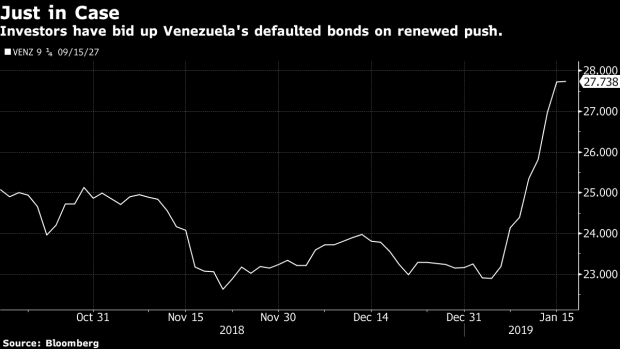Jan 16, 2019
Emboldened Venezuelan Opposition Sets Up Showdown With Maduro
, Bloomberg News

(Bloomberg) -- Venezuela’s opposition-dominated National Assembly is making a concerted effort to unseat autocratic President Nicolas Maduro, invoking constitutional measures that would seat an acting chief executive and offering blanket amnesty to military and government officials who help in bringing down the regime.
In a matter of a week, Venezuela’s beaten down and divided opposition has rallied around a 35-year-old lawmaker, Juan Guaido, who was sworn in as assembly president two weeks ago. He has spoken publicly about the emergency line of succession under which he could become the constitutional leader of the crisis-weary nation, but has stopped short of claiming the title.
In a flurry of action on Tuesday, CNN reported that U.S. President Donald Trump is preparing to recognize Guaido as Venezuela’s real leader while his Vice President Mike Pence spoke with the new opposition leader offering his support. Guaido, a close ally of Leopoldo Lopez, who is serving a 14 year sentence under house arrest for challenging Maduro in 2014, has also spoken with a lawmaker son of Brazilian President Jair Bolsonaro and penned an opinion piece in the Washington Post laying out his argument for why the assembly -- the only democratically elected body left -- should form a transition government and call for new elections.
Read a QuickTake: Why Venezuela’s Sliding Toward Dictatorship, Default
“As president of the National Assembly, I am fully able and willing to assume the office of the presidency on an interim basis to call for free and fair elections,” Guaido wrote in the column. “With a united National Assembly, along with the military, the people and even those who still support this regime, we can materialize the mandate the Constitution endows on us.”
After Maduro began his second term Jan. 10, the opposition and international community have argued that his victory was illegitimate since it was won through elections deemed fraudulent by at least 60 countries including the U.S. and the European Union. Since he succeeded Hugo Chavez in 2013, the country has been ravaged by hyperinflation and hunger.
On Tuesday, the National Assembly formally declared Maduro’s new term illegitimate, called for a transition government and elections “as soon as possible.” The assembly said it would “set the legal conditions to begin a gradual and temporary process” for Guaido to assume the presidency in the absence of a legitimate leader.
Military Sphinx
The odds of success are unclear, and the army -- the nation’s crucial institution -- has been silent.
“There are no insights on how to gauge military support; however they remain the power broker on whether they orchestrate a democratic transition,” Siobhan Morden, the head of Latin America fixed income strategy at Nomura Securities, wrote in a report.
The Maduro regime is taking the threat seriously. On Sunday, political police briefly detained Guaido. Though officials later disavowed the action, video of the arrest spread quickly. In a Monday speech, Maduro scoffed at the idea of handing Guaido the reins of power. “I’m going to give you the sash, big boy, to see what you do with the country,” Maduro said, referring to the president’s tricolor ceremonial garment.
Street Politics
Both the opposition and government have called for large marches on Jan. 23 as a test of strength and faith from their followers. The date marks the 1958 toppling of military dictator Marcos Perez Jimenez. A strong showing by Maduro opponents could energize not only the traditional middle- to upper-class political opposition but also poorer Venezuelans who bear the brunt of the crisis.
Maduro has refused to change course, quashing opponents and their efforts to remove him through votes or force. In 2017, he convened an all-powerful Constituent Assembly and virtually nullified the legislature, the National Assembly, which is the only elected institution not controlled by his allies. Protests that had claimed more than 120 lives swiftly petered out.
Under Maduro’s leadership, Venezuela’s oil production has sunk by about 1.5 millions barrels a day, the economy has contracted for five straight years and inflation has sky rocketed to an estimated 239,900 percent. The crisis and political crackdown have driven nearly 3 million Venezuelans to leave their home country by land, sea or air and the military has amassed ever more power over the economy as a reward for their political loyalty.
After suspending most debt payments in late 2017, most of Venezuela’s bonds trade in the low- to mid- 20-cent range though have seen a rally of sorts in recent weeks. The country’s dollar bonds have jumped 21 percent this year on average, according to JPMorgan Chase & Co., for the best gains in developing markets.
Trained as an engineer, Guaido more than a decade ago began organizing demonstrations against Chavez after the late leader silenced critics by refusing to renew the broadcast license of Venezuela’s most popular television channel. He formed a close relationship with Lopez, then a Caracas mayor, and later helped him form the Popular Will party. Even with Lopez under house arrest, they talk several times a day.
To contact the reporter on this story: Daniel Cancel in Sao Paulo at dcancel@bloomberg.net
To contact the editors responsible for this story: Vivianne Rodrigues at vrodrigues3@bloomberg.net, Stephen Merelman, Julia Leite
©2019 Bloomberg L.P.


